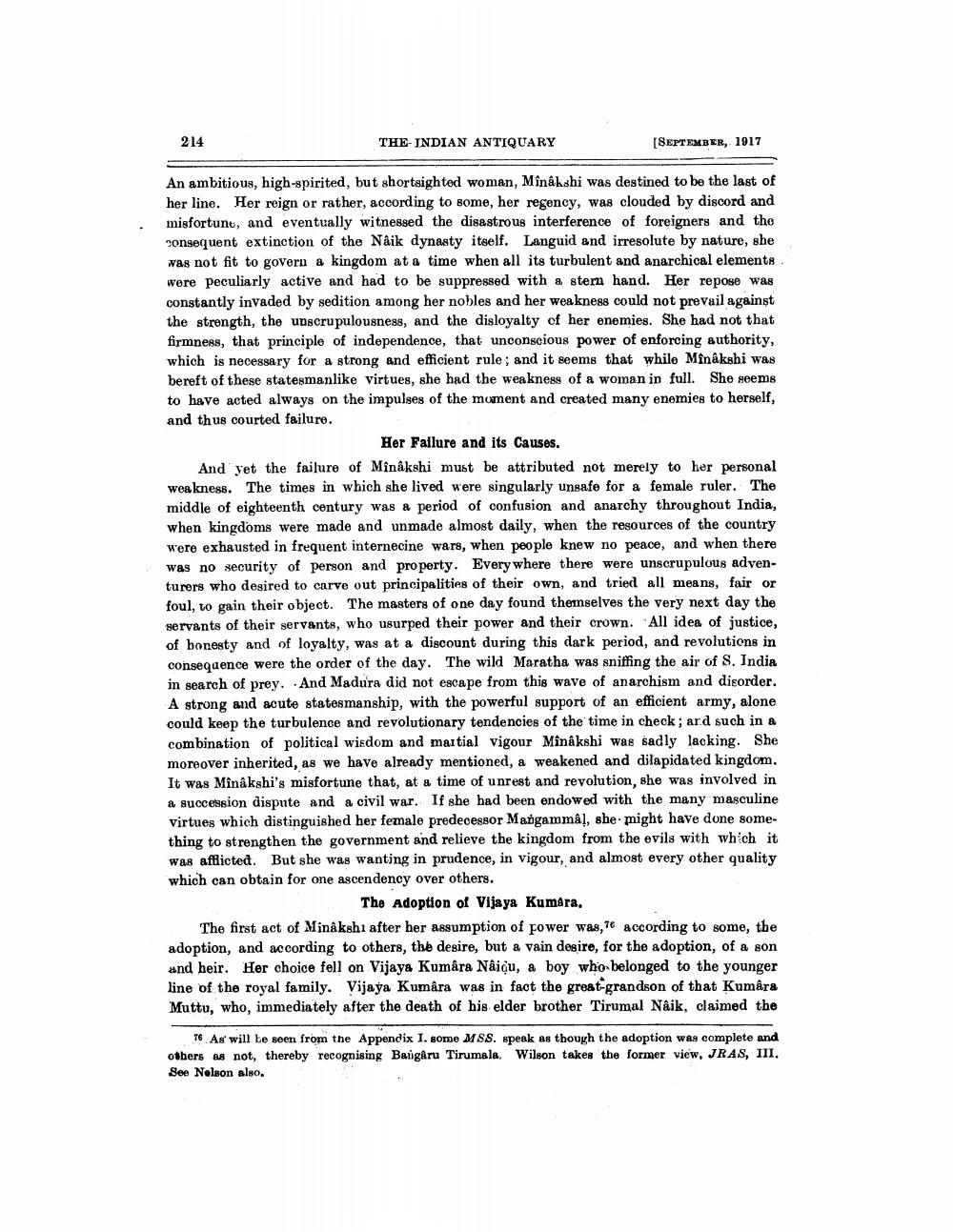________________
214
THE INDIAN ANTIQUARY
[SEPTEMBER, 1917
-
An ambitious, high-spirited, but shortsighted woman, Mînakshi was destined to be the last of her line. Her reign or rather, according to some, her regency, was clouded by discord and misfortunt, and eventually witnessed the disastrous interference of foreigners and the consequent extinction of the Näik dynasty itself. Languid and irresolute by nature, she was not fit to govern a kingdom at a time when all its turbulent and anarchical elements were peculiarly active and had to be suppressed with a stern hand. Her repose was constantly invaded by sedition among her nobles and her weakness could not prevail against the strength, the unscrupulousness, and the disloyalty of her enemies. She had not that firmness, that principle of independence, that unconscious power of enforcing authority, which is necessary for a strong and efficient rule, and it seems that while Minakshi was bereft of these statesmanlike virtues, she had the weakness of a woman in full. She seems to have acted always on the impulses of the moment and created many enemies to herself, and thus courted failure.
Her Failure and its Causes. And yet the failure of Mînakshi must be attributed not merely to her personal weakness. The times in which she lived were singularly unsafe for a female ruler. The middle of eighteenth century was a period of confusion and anarchy throughout India, when kingdoms were made and unmade almost daily, when the resources of the country were exhausted in frequent internecine wars, when people knew no peace, and when there was no security of person and property. Every where there were unscrupulous adventurers who desired to carve out principalities of their own, and tried all means, fair or foul, to gain their object. The masters of one day found themselves the very next day the servants of their servants, who usurped their power and their crown. All idea of justice, of bonesty and of loyalty, was at a discount during this dark period, and revolutions in consequence were the order of the day. The wild Maratha was sniffing the air of S. India in search of prey. And Madura did not escape from this wave of anarchism and disorder. A strong and acute statesmanship, with the powerful support of an efficient army, alone could keep the turbulence and revolutionary tendencies of the time in check; ard such in a combination of political wisdom and martial vigour Minakshi was sadly lacking. She moreover inherited, as we have already mentioned, a weakened and dilapidated kingdom. It was Minâkshi's misfortune that, at a time of unrest and revolution, she was involved in a succession dispute and a civil war. If she had been endowed with the many masculine virtues which distinguished her female predecessor Mangammal, she might have done something to strengthen the government and relieve the kingdom from the evils with which it was afflicted. But she was wanting in prudence, in vigour, and almost every other quality which can obtain for one ascendency over others.
The Adoption of Vijaya Kumara, The first act of Minakshi after her assumption of power was, 76 according to some, the adoption, and according to others, the desire, but a vain desire, for the adoption, of a son and heir. Her choice fell on Vijaya Kumara Nâiąu, a boy who belonged to the younger line of the royal family. Vijaya Kumara was in fact the great-grandson of that Kumâra Muttu, who, immediately after the death of his elder brother Tirumal Naik, claimed the
76 As will be seen from the Appendix I. some MSS. speak as though the adoption was complete and others as not, thereby recognising Bangâru Tirumala Wilson takes the former view, JRAS, III. See Nelson also.




